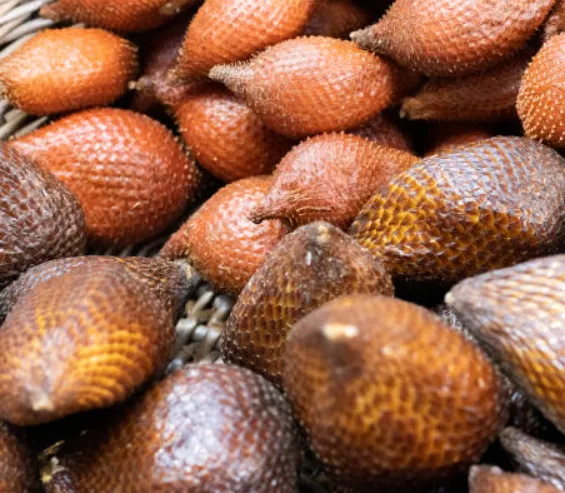The Importer's Handbook to Salak (Snake Fruit): Pondoh vs. Bali Varieties

Salak: The Exotic Indonesian Fruit Captivating Global Palates
In the competitive world of tropical fruits, offering something unique is a powerful market advantage. Salak (Salacca zalacca), commonly known as Snake Fruit due to its reddish-brown, scaly skin, is precisely that—an exotic, intriguing, and delicious fruit that is capturing the attention of consumers worldwide. As one of the world's primary producers, Indonesia offers several distinct cultivars, but for international importers, the two most commercially significant varieties are Salak Pondoh and Salak Bali.
Understanding the nuanced differences between these two is critical to sourcing the right product for your target market. This comprehensive handbook from PT Sinar Sunda Nusantara will guide you through their unique characteristics, quality specifications, and logistical requirements, empowering you to make the most informed purchasing decision.
The Foundational Appeal: What Makes Salak a Great Export Product?
Before diving into the varieties, it’s important to understand why Salak is an excellent addition to any exotic fruit portfolio. Unlike many other tropical fruits, Salak has a relatively firm structure and lower water content, giving it a naturally longer shelf life. Its flesh is segmented into lobes, similar to a garlic clove, offering a satisfyingly crisp and crunchy texture. The flavor is a complex and refreshing blend of sweet and tart, often compared to a combination of pineapple, apple, and banana. This unique sensory experience makes it a high-value item in specialty retail stores and a talking point for consumers.
Variety Deep Dive: Salak Pondoh vs. Salak Bali
While both are Salak, their taste, texture, and origin create distinct market opportunities.
1. Salak Pondoh: The Epitome of Sweetness
Originating from the fertile slopes of volcanoes in Yogyakarta and Central Java, Salak Pondoh is the most widely cultivated and exported variety, primarily due to one key characteristic: its consistent and intense sweetness.
- Flavor Profile: Salak Pondoh is renowned for being sweet, even when harvested at a stage that appears slightly young. It has very low acidity, resulting in a flavor that is pure, sugary, and often described as having notes of pear and lychee. It lacks the astringent aftertaste that can be found in some other Salak varieties.
- Texture: The flesh is typically firm, crunchy, and slightly starchy or dry compared to its Balinese counterpart. This firm texture contributes to its excellent durability during shipping.
- Appearance: The fruit is generally round or conical with a dark brown, neatly patterned skin.
- Market Suitability: Its straightforward, intense sweetness makes it a crowd-pleaser and highly suitable for markets that prefer low-acidity fruits. It's perfect for fresh consumption as a snack and is often the first variety new consumers try.
2. Salak Bali: The Juicy, Aromatic Contender
As the name suggests, this variety hails from the island of Bali. While also sweet, Salak Bali is celebrated for its more complex and balanced flavor profile, along with a higher moisture content.
- Flavor Profile: Salak Bali offers a delightful balance of sweet and tart, creating a more refreshing and zesty experience. Its aroma is often more pronounced, with hints of citrus and other tropical notes. It's the connoisseur's choice for a more sophisticated palate.
- Texture: The flesh is noticeably juicier and more succulent than Pondoh. While still crisp, it provides a more hydrating and refreshing mouthfeel.
- Appearance: The fruit can be slightly more elongated, and its skin patterns may be less uniform than Pondoh.
- Market Suitability: Its complex flavor makes it ideal for gourmet retail, fruit salads, and culinary applications where its slight tartness can cut through richness, such as in desserts or even savory sauces.
Essential Specifications for Importers
When placing an order for Salak, a professional supplier should provide clarity on the following export-grade specifications:
- Grade: Premium (Grade A) Salak should be uniform in size, free of bruising, mold, or significant skin damage.
- Size (Count): Salak is graded by the number of fruits per kilogram. Common export grades are 15-20 pieces/kg (large) or 21-25 pieces/kg (medium).
- HS Code: The standard Harmonized System code for Salak is 0810.90.
- Packaging: To ensure protection and proper ventilation, Salak is typically packed in 5kg or 10kg corrugated cartons or plastic crates. Each fruit is often individually placed to prevent bruising.
Logistics and Handling: Preserving Freshness from Farm to Destination
The key to a successful Salak import is a meticulously managed supply chain. The fruit is harvested by hand and must be handled carefully to avoid damaging its delicate skin. At PT Sinar Sunda Nusantara, we ensure that after sorting and grading, the fruit is immediately pre-cooled and loaded into a refrigerated (reefer) container. The optimal shipping temperature for Salak is around 12-15°C to maintain its freshness and crispness during transit. All necessary documentation, including the Phytosanitary Certificate and Certificate of Origin, is prepared by our expert team to guarantee smooth customs clearance at your destination port.
Conclusion: Which Variety is Right for You?
Your choice between Salak Pondoh and Salak Bali should be driven by your target consumer. If your market desires an easy-to-eat, reliably sweet, and exotic snack, Salak Pondoh is the perfect, high-volume choice. If you cater to a gourmet audience that appreciates a more complex, juicy, and aromatic fruit experience, Salak Bali will be a highly valued addition to your portfolio.
As a leading supplier of Indonesian agricultural products, PT Sinar Sunda Nusantara can source both premium varieties to your exact specifications. We are committed to quality, transparency, and building lasting partnerships with our international clients.
Ready to introduce this unique Indonesian treasure to your market? Contact our export team today for a detailed discussion, current pricing, and a personalized quote.